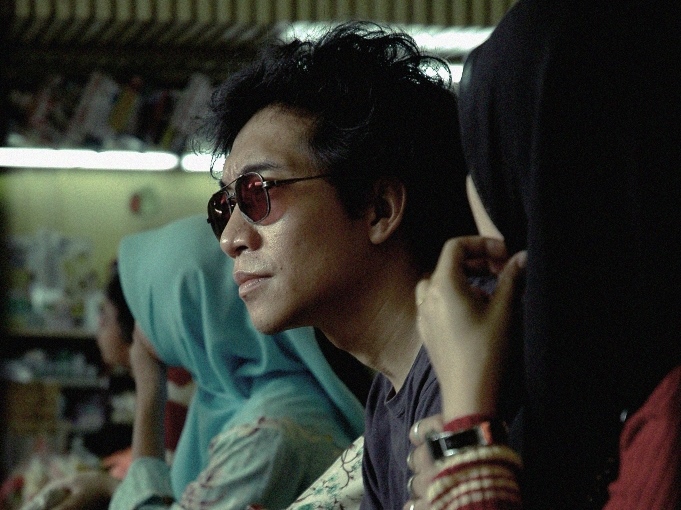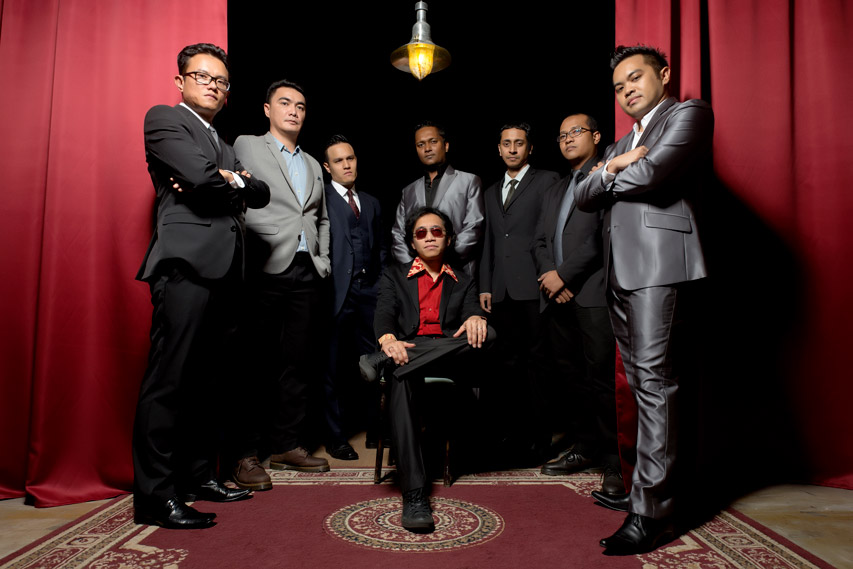Searching for a New Malay Rhetoric with Azmyl Yunor & Orkes Padu
 Thirsty for JUICE content? Quench your cravings on our Instagram, TikTok and WhatsApp
Thirsty for JUICE content? Quench your cravings on our Instagram, TikTok and WhatsApp
When news of Azmyl Yunor & The Sigarettes disbanding broke out in 2014, many fans were left distraught and believed it to be the end of Azmyl’s music career (at least as frontman of the rock band). Lo and behold, it was just one of many transitions in the folk-inspired, singer-songwriter’s journey, resulting in his third studio album
Was Was, the last in his W Trilogy on the Malaysian psyche. Forming Orkes Padu with long-time collaborator, drummer-producer Raje as band leader, Azmyl’s new backing band consists of a growing lineup of 10 musicians that include Jason Ong of Ben’s Bitches (of which Azmyl is also a member), N. Rama Lohan of Cats In Love, Syaril Zizi and Sadat of False Opus, Mustaq of Keladak and Space Gambus Experiment, Ammar Khairi of Maharajah Commission (another one of Azmyl’s side-projects), and jazz saxophonist Adil Johan amongst others. JUICE caught the reclusive academic-artiste at his farm in Dengkil to find out more about his band’s latest incarnation and creating a more relevant Malay rhetoric that doesn’t revolve around traditional headgear or religion…
Images Darshen Chelliah
Last we spoke was in 2012, after you launched Wilayah. How do you feel about the new album now that it’s been out for months?
It feels good. You got to be enjoying playing the songs you have chosen to be part of an album, and I love playing them live. Reception concerns should be something you do in hindsight, now’s the time to revel in it, even if it borders on syiok sendiri. The reception has been great at shows but we’re not touring with this record, we’re taking it easy. But I have to admit, trying to sell your record is a bit of a drag and my least favourite bit.
“If it starts to feel like a job, I’m outta here.”
Why did you decide to ‘disband’ Sigarettes?
I guess ‘disband’ was too strong a word when we announced it. The band kinda morphed into Orkes Padu, like how a caterpillar metamorphoses into a butterfly or moth. I’ve had the pleasure of making new friends through playing music throughout the years that I guess I’m bound to start jamming or doing something musical with some of them. The pool of friends just got bigger. We all play or have played in various bands, which is normal, and being the nature of most independent bands in the country, there is a lot of lull in activity, whether gigging or recording. Nothing much happens if you don’t make it happen. So, we all got together while recording this album, most of the time it was about who was available.
Was Was means doubt in Malay…
Yes, and doubt is an essential expression in being alive. Our institutions are crumbling, maybe things aren’t gonna be like they used to be, also with the other opinion that this is the best we’ve got. We all have stories, and Was Was is a narrative of multiple POVs like in filmmaking.
You have said that a lot of your music is about letting go. Do you ever fear that your music will get contrived?
If I fear getting contrived, I would’ve stopped making music! I’m a “first thought, best thought” kind of guy. Songwriting should not involve too much thought, you’re not writing a book. You’re making brushstrokes on a canvas. If you think too much – be it about an audience, bad reviews, sales – then you and your music become contrived. It’s not exciting anymore. You should be enjoying playing and making music, that’s as simple as it is for me. If it starts to feel like a job, I’m outta here.
“I think the link between acoustic guitars and singer-songwriter is clichéd – you can be a singer-songwriter with any instrument.”
If it makes any sense, my philosophy to making music recordings is similar to using the visual medium: I started out making lo-fi cassette recordings on my own – the songs were impressionistic vignettes – which is equivalent to the solitary photographer taking black and white photographs. Then I found friends who could help out with my songs, so I recorded in a friend’s home studio to make an EP – the audio equivalent of a self-funded short film. So albums are like feature length films, there is a narrative if you listen hard enough. I think sometimes we as music consumers get too wrapped up around notions of ‘authenticity’. In the visual medium, realism can be the central focus because the visual medium does not pretend to be ‘real’, it acknowledges itself as a representation of what is real. Music tends to wear too much of its heart on its sleeve.

How did you get into country and folk music? It doesn’t seem like a genre most young people would dig.
My dad listens to a lot of country, I grew up listening to Kenny Rogers and Johnny Cash on the family tape deck when we balik kampung. I think the appeal was also the storytelling and the sense of space that country and folk music exuded. Musically too, it sounded like something you could try doing yourself, you didn’t have to be a musical genius or guitar god. R.E.M.’s Out of Time (1991) got me further into that folk rock-y thing and when I bought their IRS Records Best of… compilation, I was hooked. I read up a lot on the genre, going to bookstores and ripping the plastic covers to read their bios, there was no internet then. Mind you, I was into other ‘90s stuff too – like grunge, etc. – it’s just that I also dug country and folk.
“There was a time when the Malay language was ours as a nation – we had pop singers like Francesca Peters, DJ Dave, Alleycats, Ben Nathan, Kenny, Remy & Martin, etc. – not a segment of the music market.”
What do you think of local indie music these days?
Frankly, I’m a bit out of touch, but I did stumble onto some interesting new bands that I liked. I really like Janitor and their Bilik Janitor EP and the Simfoni Ketiak Berachun / Shitnoise Bastards split cassette EP, but those were from 2014, right? Damn, I haven’t checked out anything from 2015 except for Peter Brown’s new album (Blues), which I really liked too!
Speaking of whom, you were and still are a part of the active solo singer-songwriter scene where many hopefuls strum their hearts out on acoustic guitars every night. Have you noticed any trends or changes to this scene since starting in it?
Well, there’s certainly a hell lot more people with acoustic guitars now than ever. It’s trendy, that’s for sure. I think the link between acoustic guitars and singer-songwriter is clichéd – you can be a singer-songwriter with any instrument. All the success stories in the past decade, especially with female singer-songwriters, have in a way made the genre and acoustic guitars more appealing to the youth and I think that’s great. It’s also empowering to see more females performing and being better at it than the boys. When I started gigging ages ago, there were hardly any women in the audience. I like acoustic guitars simply because you don’t need an amp, a bunch of pedals, and electricity to play them. They’re very portable too, beats having a piano.
“…nobody is going to lose their cultural or religious identity by being proficient in another language.”
All your albums have been bilingual.
I felt more comfortable writing and expressing in English for the longest time but then I liked the challenge of taking on something more colloquial and trying something with it. There are a lot of aspects of the Malay language that is not explored in songs. It’s already happening now in the local literature scene, the writers are bigger rockstars than rockstars. There was a time when the Malay language was ours as a nation – we had pop singers like Francesca Peters, DJ Dave, Alleycats, Ben Nathan, Kenny, Remy & Martin, etc. – not a segment of the music market. Industry-wise, languages had divided our listenership. This doesn’t have to happen in the underground or independent music circuit, we’re not dependent on ‘markets’. I wanna celebrate that time in the ‘80s when I was growing up, when the Malay language was everyone’s, not just a particular race. On the flipside, I guess you can also say I kinda ran out of things to say in English.
What’s the most urgent matter that needs to be addressed within the Malay community at the moment?
Encourage the usage of English language in daily life – nobody is going to lose their cultural or religious identity by being proficient in another language.
Was Was retails at all good record shops and Azmyl Yunor & Orkes Padu gigs. Keep up with the band at facebook.com/azmylorkespadu and soundcloud.com/azmyl.
More interviews here.


 Get Audio+
Get Audio+ Hot FM
Hot FM Kool 101
Kool 101 Eight FM
Eight FM Fly FM
Fly FM Molek FM
Molek FM